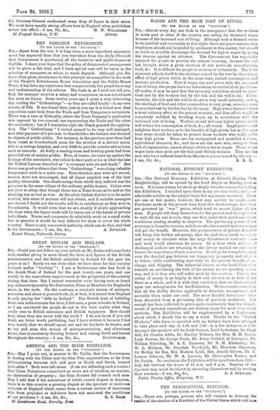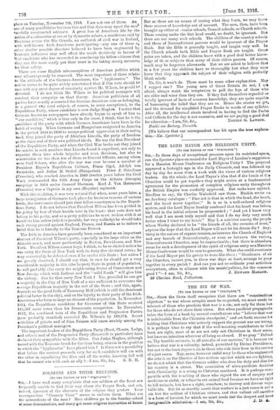place on Tuesday, November 7th, 1916. I am not one
of them. An one of many possibilities between this and that date may upset the most carefully constructed estimate. A great loss of American life by the action of a submarine at sea or by dynamite ashore, a murderous raid by
Mexicans across tho Rio Grande, an outbreak of civil war in Ireland, with well-known Irish-Amorieans partiaipating--any one of these or
other similar possible disasters believed to have been engineered by Teutonic influences may well effort the result decisively in favour of that candidate who has succeodod in convincing his fellow-citizens that they can the more surely put their trust in his taking strong measures for their safety.
There aro some English misconceptions of AMOrieDII polities which may advantegoeusly be removed. The most important of these relates
to the attitude of the German-Americans, the " hyphenates." The
notion /IODIDE to be quite widely entertained that if this vote should be east with any great degree of unanimity against Mr. Wilson, he yould be
defeated. I do not think Mr. Wilson or his political managers will conduct their campaign on that theory. American politicians of all parties have usually accounted the German-American vote as belonging,
in a general svhy (and subject, of course, to some exceptions), to the Republican Party, whose candidate is now Judge Hughes. I notice that . German-American newspapers have already begun to speak of him as "our candidate," which is true only in the sense, I think, that ho is the candidate of the party with which German-Americans have been in the habit of voting. When Germans and Hungarians emigrated to America
in tho period 1848 to 1850 to escape political oppression in their native land, they joined the party of Abraham Lincoln, the party of freedom to the slave and of their own political ideals. Ho was the first President of the Republican Party, and when the Civil War broke out they joined his armies in such numbers that Lincoln found it expedient, not only to organize them into whole brigades and oven divisions, but also to commission no less than ten of them as General Officers, among whom were Carl Schurz, who after tho war was over bosame a member of President Hayes's Republican Cabinet, Franz Sigel, Adolph von Stainwohr, and Julius H. Stahel (Hungarian). Peter J. Oaterhaus (Prussian), who reached America in 1849 (twelve years before the Civil War), commanded the 15th Army Corps on the Atlanta (Georgia) campaign in 1864 under General Sherman. Karl J. Von Herrmann (Prussian) was a Captain in ray own (Regular) regiment.
With this tradition, it was very natural that when, some years later, a large immigration of Germans took place for buainees reasons of various kinds, tho newcomers should join their follow-countrymen in tho Repub- lican Party. I do not believe that President Wilson has bean guided in his policy by feer of their hostile vote in the least : that vote does not
belong to his party, and as a perty politician he mast reckon with it as hostile to him unless (which is possible, but very unlikely) ho should take ouch strong ground against England, France, and Russia as to induce a belief that he is friendly to the Teutonic POWOZO.
The Irish in America have generally been considered as an important element of President Wilson's party, especially in the large cities on the Atlantic coact, and more particularly in Boston, Providence,. and Now York. President Wilson cannot hope, I think, to be re-oloeted unless he can carry the State of New York with its forty-five doetoral votes ; he may conceivably be defeated oven if lie carries this State : but unless I mu greatly deceived, I should say that, in once he should got a very considerable majority in this (the largest) State in point of population, be will probably also carry the neighbouring States of Connecticut and New Jereoy, which with Incliona and the "solid South" will give him the victory. Can he then carry New York ? Yee, provided he can get a majority in the City of New York of a sizo sufficient to overcome the sverago Republican majority in the rest of the State : and this, again, depends on the good faith of Tammany Hall (which is still the dominant political factor in the city), and on the loyalty to their party of the Irish- Americans who form so large an element of the population. In November, 1914, the Republican candidate for Governor of this State received 145,507 more votes than his Democratic competitor. In November, 1912, the combined vote of the Republican and Progressive Parties (now probably reunited) exceeded Mr. Wilson's by 189,974. Secret activities of priests and of Sinn Foiners will cause anxiety among the President's political managers.
The important loaders of the Reptiblican Party (Root, Choate. Lodge, and others) and of tho Progressive Party (Roosevelt in particular) have declared their sympathies with the Allies. Can Judge Hughes, although tarred with the Teutonic brush for the time being, remain in the position in which the "hyphenates' have placed him ? Is there not a possibility
that before the contest proceeds very far each candidate will vie with the other in repudiating the Hun and all his works, knowing full well
that he cannot win with such an ally ?—I am, Sir, Sm., S. R. IL



































 Previous page
Previous page